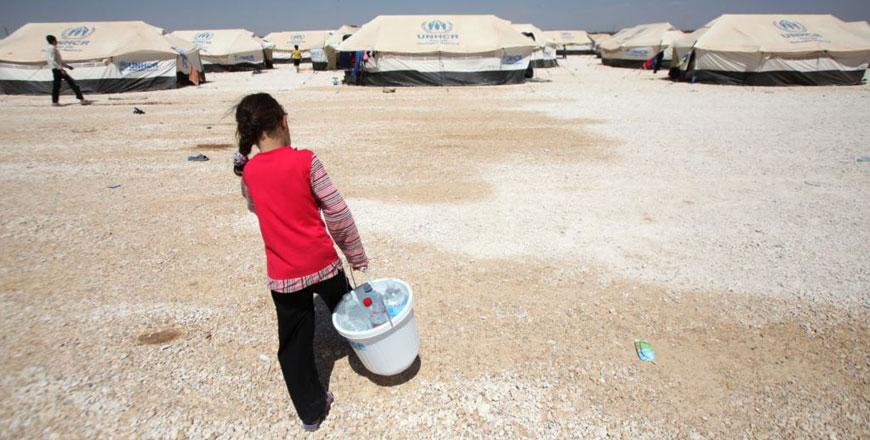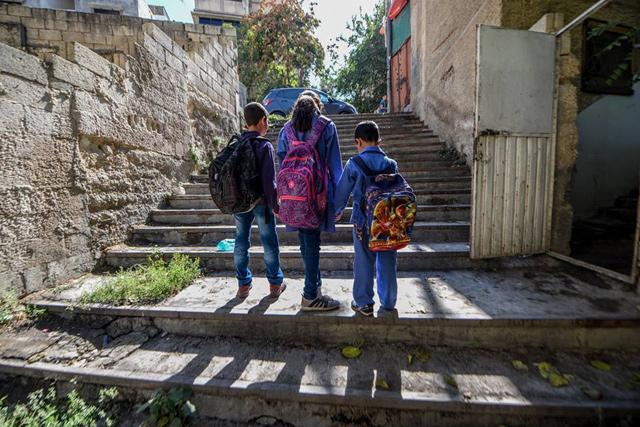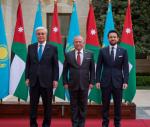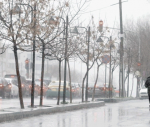You are here
In Lebanon, getting Syrian children in school a huge task
By Reuters - Oct 12,2016 - Last updated at Oct 12,2016
NABATIEH, Lebanon — Twelve-year-old Abdulrahman has not set foot in a classroom for nearly three years. Instead of going to school, he works at the grocer's downstairs from 7am to 9pm, packing fruit and vegetables to support his family.
Since the family fled Syria in 2014, they rely on his wages, around $10 a day, and those of his 15-year-old brother who works in a garage, to buy food and rent a barely furnished flat.
Lagging far behind and shackled by adult responsibilities, the slight Abdulrahman sees no prospect of resuming his education.
"Dad hardly finds any work, so I have to. That's it," he said quietly when asked if he wanted to return to school.
He and his brother are among an estimated 250,000 Syrian refugee children in Lebanon who are out of school, often having missed years of formal education.
It is a crisis that ensures the effects of Syria's war, now in its sixth year, will be long felt throughout the region, where hundreds of thousands more out-of-school children live. They face growing up as a lost generation vulnerable to abuse by traffickers and recruitment by extremist groups.
Western nations and Lebanon's education ministry recognise the scale and significance of the issue.
But an ambitious drive to provide schooling for all Syrians and poor Lebanese, funded with tens of millions of dollars a year, mostly from EU countries and the United Nations, has struggled to meet even interim enrolment targets.
Families interviewed by Reuters in different parts of Lebanon spoke of a range of barriers to putting their children in school, including poverty and reliance on child labour, government-imposed movement restrictions and public schools turning Syrian pupils away as the new academic year begins.
Aid and rights groups report similar difficulties, some rooted in Lebanese government policy on refugees and others beyond its control.
'Enormous barriers'
Lebanon, which hosts more than 1 million Syrian refugees including nearly 500,000 children, last year launched a campaign to enrol 200,000 in public schools, expanding a "second shift" system of additional afternoon classes exclusively for Syrians.
The tiny Mediterranean country's response to the Syrian crisis has often been praised by the international community, which has repeatedly pledged to help it cope with the influx of refugees.
Donors gave $267 million for education in 2015, including the schools campaign, and another $207 million this year, according to an annual UN aid report and figures from the UN refugee agency, making education one of Lebanon's best-funded sectors for Syria aid.
But tens of thousands of places went unused as no more than 159,000 Syrians enrolled in public school, according to government and charity estimates.
An unknown number of those dropped out. Among Syrians aged 15-17, 95 per cent are not in school, Human Rights Watch said in a recent report.
The plan to get Syrian children into school last year was ineffective in some areas: many places allocated for Syrians were in schools far from where most refugees live, meaning at least 40,000 seats went unused, the New York-based rights watchdog's Bassam Khawaja told Reuters.
Meanwhile, some schools were "contravening the [education] ministry's policy by demanding additional documents" like residency permits, he added.
Refugees must pay $200 a year for legal residency. Most Syrians, 70 per cent of whom live in poverty, are illegal because they cannot afford that fee.
The education ministry has waived residency requirements for entry to public school, but families said some schools demanded residency, ID cards or other documents they did not have.
Residency rules also mean many parents do not leave home to look for work because they fear arrest at army checkpoints, and rely on their children for income.
Abdulrahman's family lives on around $750 a month if both children work, $500 of which goes towards rent. The rest is left for food for five people.
"We just about get by," his father Faisal said, sitting on the floor of their empty living room. At age 53 and with an injured arm, the former farmer says he seeks manual labour locally but without success.
Other difficulties include transport — one family said they had to choose which of their two children they sent to school because it cost $30 a month for the bus — and language barriers, where the Lebanese curriculum uses English and French.
The education ministry said it was working to ensure that more schools implemented government policy on letting in Syrians.
Filling the gap
Lebanon's public school system was stretched even before the Syrian conflict and catered for only about 30 per cent of all Lebanese pupils, according to UN reports, raising questions over its capacity to absorb so many more children.
Charities have privately asked to be more involved in efforts to educate the refugees that remain outside public schools, including through programmes that can keep children learning but without awarding formal qualifications, sometimes using classrooms set up in tents.
Last year Lebanon hampered some of those efforts, Human Rights Watch said, including by asking at least one organisation to shut down some unofficial schools.
Syrian refugees themselves are also filling the gap, setting up makeshift schools and volunteering as teachers, but without government approval.
Staff at one such school outside Beirut said the government had tried to close it, but the local town hall was negotiating to keep it open, provided it taught the Lebanese curriculum.
The education ministry said it recently allowed dozens of charities to operate programmes. A separate UN-funded catch-up scheme catered for nearly 18,000 children last year said UNICEF.
The scale of the problem is also drawing new private sector initiatives.
A project launched by the Clooney Foundation for Justice, backed by Google and Virgin, aims to enrol up to 10,000 children next year in schools operated by SABIS, an international company which has prepared students for college and high school exams.
It hopes to reach 50,000 children per year after that.
"It is a huge challenge... [but] we're much better off having 200,000 kids educated," SABIS CEO Carl Bistany said, noting that schools would be set up in areas most heavily populated by refugees.
But ensuring all Syrian children receive education remains an almost impossible task.
"We're not, at the start of the 2016 school year, in a situation where even if all of us club together all of our resources and capacity, we're going to secure education for all Syrian children," the Norwegian Refugee Council's Lebanon country director Niamh Murnaghan said.
Outside Beirut, another 12-year-old, Mohammed, sits at home all day waiting to know if he will get a place at the local school. With term about begin, time is running out.
Related Articles
SAADNAYEL, Lebanon — Syrian refugee Saddam Khleif hates going to school and spends most of his days either watching TV or playing outside th
AMMAN — Four million refugee children across the world remain out of school today, according to a new report issued by the UN Refugee
AMMAN — Of the 233,000 refugee children of school age in Jordan, 83,920 are out of school and are not enrolled in any formal or informal edu


















